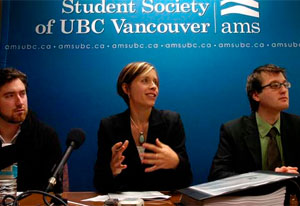The Alma Mater Society (AMS), the student body of the University of British Columbia (UBC), is up in arms over a progressive move made by two leaders of the council.
In 2009, AMS President Blake Frederick and Vice President External Tim Chu made an official complaint to the United Nations regarding rising tuition costs at the university. Such hikes, they argue, breach human rights by making UBC, supposedly a public institution, inaccessible for much of the population. Frederick and Chu claim that the British Columbian and federal governments must be held accountable for the breach.
In filing such a complaint, however, they disregarded certain procedural rules of the AMS. As such, other members of the organisation, with the support of much of the student body, are calling for their impeachment.
The context of the event and the sentiment behind it serve as a microcosm of the political climate at UBC, which is composed of, in these authors’ perspectives, 80 per cent apathy and 20 per cent rampant conservatism. Considering Frederick and Chu’s complaint, as well as the backlash against it, allows us to examine the culture within the AMS and UBC as a whole.
The AMS council, despite claims to the contrary, has proven time and again that it does not act as a space for all students’ voices to be heard and respected. Within the last year alone, the majority of the council has voted down student driven initiatives aimed at increasing the representation of marginalised groups on campus. As discussed in a previous Campus Notes article, when a suggestion to implement a non-voting disability chair was brought forward, the proposal was rejected due to claims that it would have created a precedent for other “special interest groups” to be included in the council, thereby hindering the “efficiency” of the AMS. Additionally, in October 2009 the necessity of the AMS Equity program was called into question, with the council considering it “frivolous” and “underused” despite insistence from students that such a programme is essential to creating and maintaining an involved and empowered student body.
With the exception of a minority group of activists, such actions garnered little response from the student population. UBC’s majority demographic of socio-economically privileged students has contributed to an already apathetic constituency that rarely involves itself with issues of students’ rights. Estimates of voter turnout during the last AMS election sat around a dismally low 11 per cent. However, as soon as majority privilege appeared to be threatened through Frederick and Chu’s challenge of the class advantage inherent within UBC’s tuition system, an overwhelming number of students and AMS councilors stepped forward to voice their concerns about the way in which the university was being represented.
The uproar from students not involved in the AMS council didn’t concentrate on the issue of procedural rule breaking-probably because most have no awareness of AMS policy and code, speaking to the general lack of student involvement. What people were most upset about was the fact that the UN was brought into the picture.
It would appear that our fellow students don’t think education is a universal human right. The number of people claiming that the inaccessibility of education in British Columbia is trivial was astounding. Their most popular argument? Why should we, a free and empowered nation, bother the UN when they should be dealing with war and starvation in places like Darfur?
However, these authors surmise that the UN was the correct avenue for Frederick and Chu to pursue. A group of students had already attempted to address such concerns domestically, but the BC court system does not recognise education as a right, and complaints made against UBC were thrown out (MacDonald vs. UBC). Having exhausted domestic avenues, the two looked to international means instead, using the International Covenant on Economic, Social and Cultural Rights, which states that nations should have accessible higher education, to justify their actions. The Covenant was adopted by the UN General Assembly, including Canada, in 1966.
Rather than using the debate over the complaint and the UN’s involvement to encourage active discussion around whether education should be a right and whether classism does in fact occur within UBC, the internal meetings of the AMS council focused on bureaucratic disobedience in order to drive the move towards impeachment. Doing so only further deflects our collective responsibility to recognise and address economic disparities; yet we, as students, are well-placed to make social change, given we are already part of the university institution. It is deeply troubling to see that the majority of UBC students who have the privilege of receiving higher educational are perpetuating and promoting its exclusivity and inaccessibility. We hope for more debate, and will support leaders like Frederick and Chu who recognize inequities and take action to challenge them.
Anoushka Ratnarajah is a UBC student majoring in Women’s and Gender Studies and Creative Writing. She is the President of the Women’s and Gender Studies Undergraduate Association and the Workshop Coordinator for the UBC AMS Womyn’s Centre.
Annelies Becu is a 4th year Commerce and Women’s and Gender Studies student at the University of British Columbia.



